How to wash a frying pan in the dishwasher?
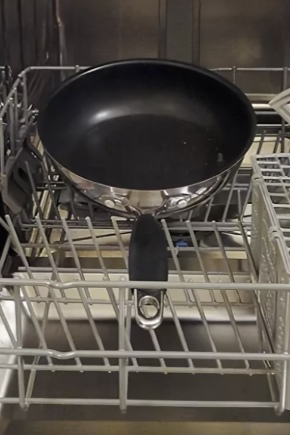
There is no doubt about the attractiveness of regular use of dishwashers at home. They provide us with maximum convenience, significantly save time and effort that we spend on washing dirty dishes and glasses.
Thanks to this technique, the kitchen becomes clutter-free within minutes. However, like any other household appliance, dishwashers have certain recommendations and limitations. Using them for washing all types of dishes is not recommended. High internal temperatures can damage some types of pans. This will be discussed in the article.
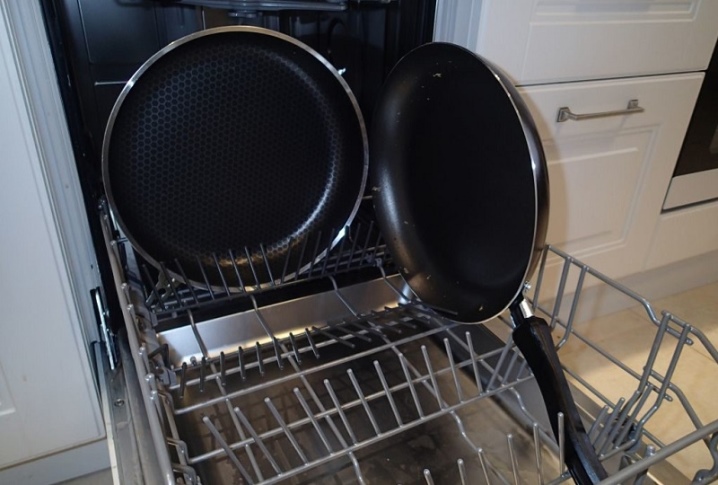
What pans can be washed?
The dishwasher can be used to wash pans that have a removable handle. Moreover, they must be made of stainless steel. Make sure the dishes are far enough away from other metal objects to avoid scratches and ensure proper washing and drying.
With most other metals, excessive moisture can corrode the metal, while washing by hand allows for better water temperature control. If you want to take care of the dishes, then you should always wash the pans by hand.
Aluminum containers may only be washed if the manufacturer permits it.
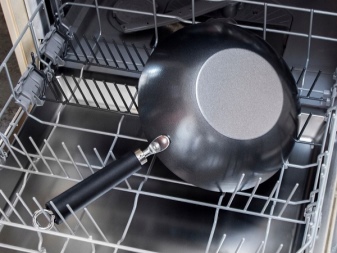
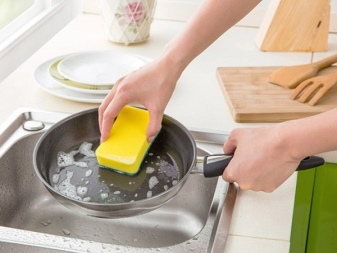
Which pans cannot be put in the dishwasher?
Most pans will deteriorate when placed in the same technique for cleaning. These are not only Tefal frying pans, but also other ceramic, cast iron, copper products that spoil easily.
Regardless of whether you use the dishes to make sauces, pasta or fry chicken nuggets, any food on it leaves a lot of stubborn stains.
It's no wonder why users often think about dishwashering their pan. No need to get your hands dirty, waste time scraping food. However, there are many reasons why using this technique can damage your pan. One of the main ones is that specialty detergents used in any model are usually more aggressive than standard dishwashing detergent.
They contain abrasive compounds such as sulfates and phthalates to remove stubborn food stains that can damage cookware.
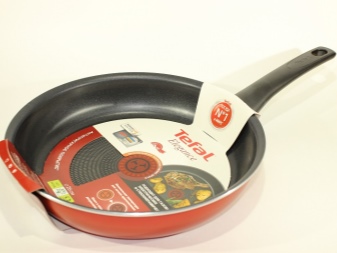
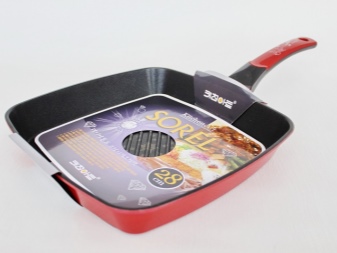
Another reason is that dishwashers damage the pans as they use very hot water to clean them thoroughly. In some models, the indicator can reach 160 degrees Celsius.
Not every coating is designed to withstand this high temperature. As a result, the surface may tarnish and the non-stick coating will simply deteriorate.
And the last reason a dishwasher can be harmful to the pan is if it is mechanically hit by other dishes. When sharp objects such as knives and forks are placed next to the pan inside the appliance, they will scratch the surface.
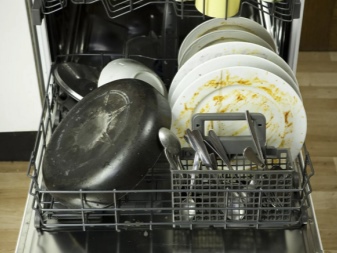
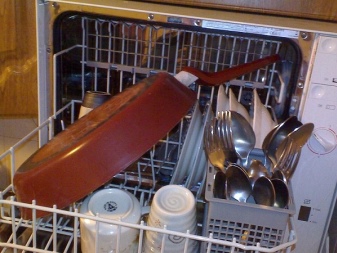
Copper
Using the described technique for copper pans is not recommended. Washing them in the dishwasher causes the dishes to tarnish and lose their beautiful shine and color.
Instead, hand-wash the pan.
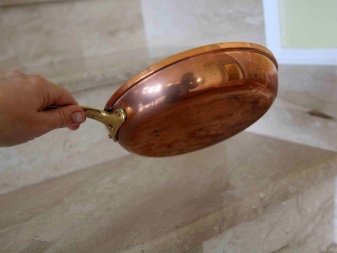
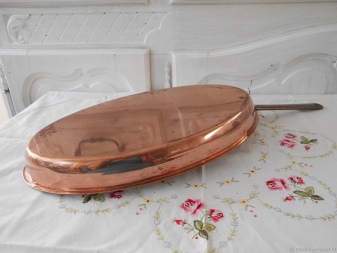
Cast iron
It is strictly forbidden to put cast iron pans in the dishwasher. When it is working, the conditions inside are not at all suitable for cast iron. These will cause cast iron pans to rust over time and wash off the protective non-stick coating. Therefore, if you do not want your cast iron pan to rust quickly, then do not put it in the dishwasher.
The destruction of a special layer will entail the need to recreate it. It will take a waste of time and effort, since this process is slow.
That is why experts advise washing cast-iron dishes, not just the frying pan, by hand.
All you have to do is simply rinse with warm water and a soft sponge.
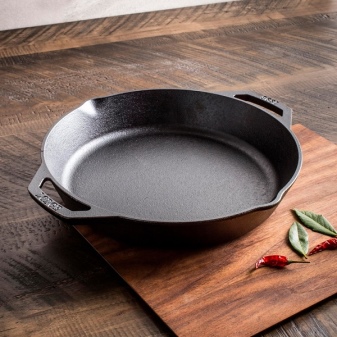
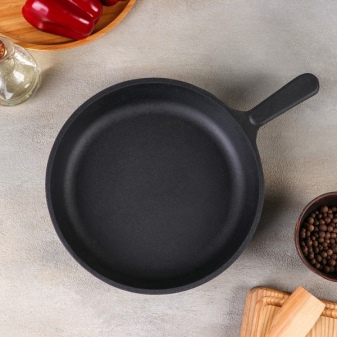
Aluminum
Placing aluminum pots and pans in the dishwasher is not always a good choice. First, you should check the instructions from the manufacturer to make sure that this particular pan can be cleaned in this way.
This metal is prone to scratches, which is why no other cookware should come into contact with it.
Aluminum can also become dull over time, so even if the pan can be placed in an appliance and cleaned, you shouldn't do this often.
It is advisable to alternate between manual and automatic washing.
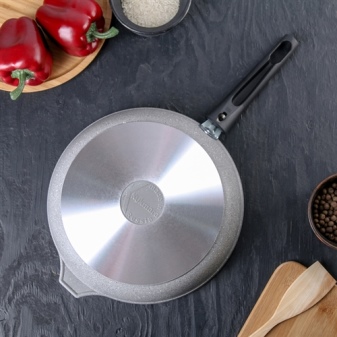
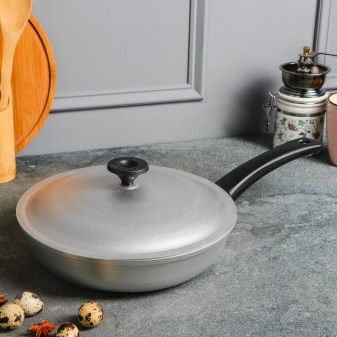
Teflon
The use of the described technique with non-stick pans is recommended only if the manufacturer specifies this on the packaging.
If there are no such instructions for the dishes, then the use of technology will certainly lead to a loss in the quality of the product.
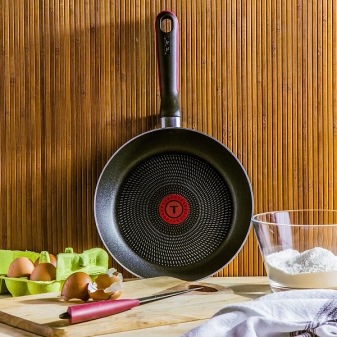
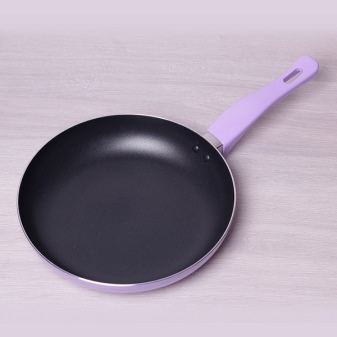
Washing tips
If food pieces are hard to come off the cast iron skillet, never try to wash oily dishes with an aggressive brush or an equally aggressive detergent. Instead, place the skillet on the stove top and pour some water into it. When the liquid boils, the pieces of food will come off on their own without harming the coating.
A common method of cleaning the burnt bottoms of copper pans is to sprinkle them generously with salt. It washes out burnt food perfectly if you add a little vinegar to it and allow this composition to dissolve the remnants of the food.
After waiting about 20 seconds, you can easily scrape off the carbon deposits on the bottom of the copper dish. What will be your surprise when you realize how easy it is to clean a frying pan after soaking it in salt and vinegar.
If you decide to use a dishwasher to clean your aluminum pan, you need to be careful. The main thing is to properly balance the container inside, placing it away from metal objects. This is the only way to avoid unnecessary scratches.
If the user is attracted by an aluminum product for its beauty, then experts do not recommend, in general, to use the technique. To preserve the original shine, it is better to clean the dishes the old fashioned way: with a sponge and liquid gel.
Warm water and a quality cleaner will do the trick.
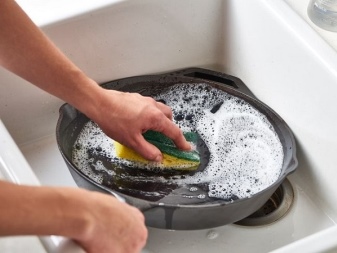
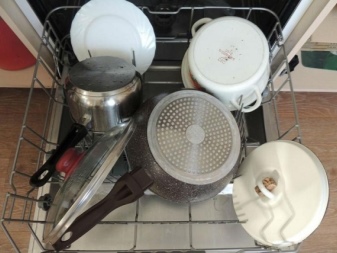













The comment was sent successfully.